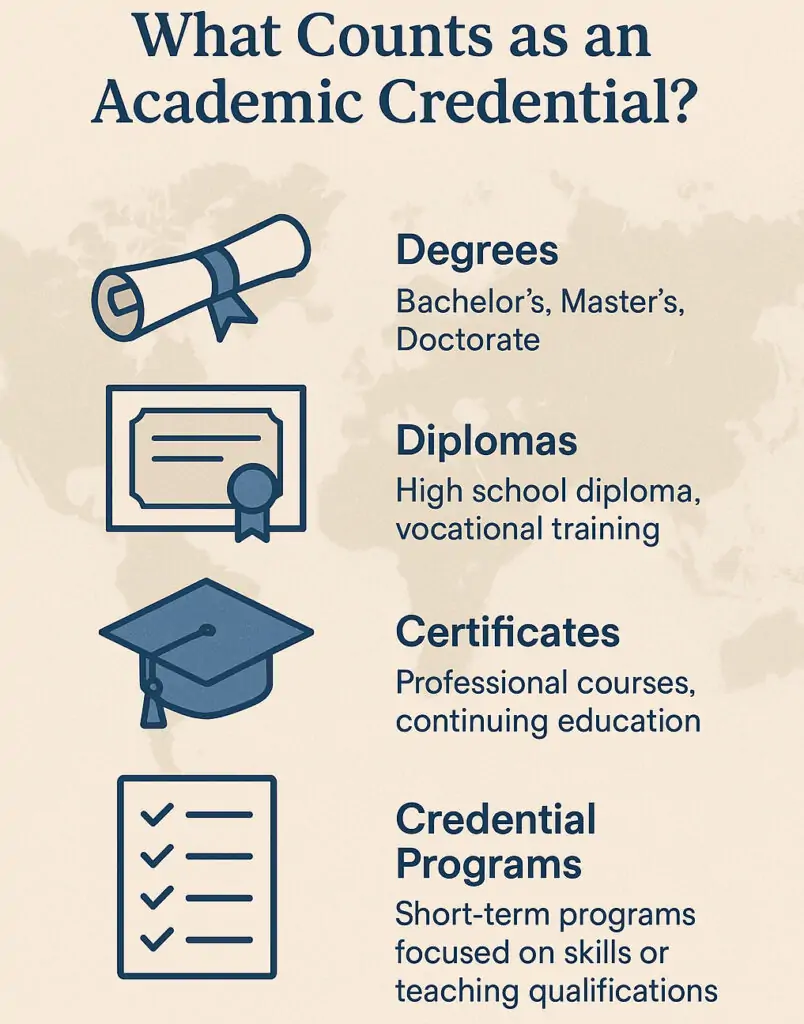Academic credentials are the foundation of your educational and professional qualifications. Whether you’re applying to a university, seeking employment, or pursuing licensure, you’ll often be asked to present documentation of your academic achievements. But what exactly counts as an academic credential?
In this article, we’ll explain the meaning of academic credentials, outline different types, and clarify how they’re used worldwide, including in credential evaluations conducted by services like ACEI.
What Counts as an Academic Credential?

What Are Academic Credentials?
Academic credentials refer to the documents that certify your educational achievements. These may include diplomas, degrees, transcripts, certificates, or records of professional training. They formally recognize that you’ve completed specific coursework or earned a qualification from an educational institution.
Whether issued in the U.S. or abroad, academic credentials help verify your level of education and may be required for:
- University admissions
- Professional licensure
- Immigration or visa applications
- Employment opportunities
When earned outside the U.S., services like ACEI often evaluate these credentials to determine their U.S. equivalency. Learn more about the credential evaluation process.
Types of Academic Credentials
| Credential Type | Definition | Examples | Typical Use |
| Diploma | Certificate issued after completing secondary or vocational studies | High school diploma, trade diploma | College entry, vocational employment |
| Degree | Formal qualification from a postsecondary institution | BA, BSc, MA, MBA, PhD | Academic progression, professional work |
| Certificate | Recognition of completion of a course or training program | TESOL certificate, data analytics course | Professional development, licensure |
| Transcript | Academic record showing courses, grades, and credit hours | University transcript | Credential evaluations, admissions |
| Credential Program | Short-term or targeted programs providing specific training or qualifications | Teaching credential, leadership program | Licensure, skill validation |
What Is a Credential Program?
A credential program is a specialized academic offering, usually shorter than a full degree, that provides training in a specific field. In the U.S., teaching credential programs are a common example. These programs prepare individuals to meet state licensure requirements for public education.
Credential programs can be:
- Post-baccalaureate (after earning a degree)
- Standalone certifications for fields like project management, digital marketing, or special education
While not equivalent to a full degree, employers and licensing bodies often recognize credential programs as proof of expertise in a particular area.
Why Academic Credentials Matter
Your academic credentials demonstrate your educational journey and skills. They’re critical for gaining access to:
- Advanced education (such as graduate school)
- Skilled employment opportunities
- Professional practice in regulated fields
Academic credentials must often be evaluated for U.S. equivalency for internationally educated individuals. ACEI is a recognized credential evaluation service and a charter member of the Association of International Credential Evaluators (AICE), ensuring your credentials are assessed with accuracy and global standards.
Related Reading
- Credential Evaluation – A Step-by-Step Guide
- Recognition of Foreign Degrees in the U.S.
- Course-by-Course vs. Document-by-Document Evaluation
Need your credentials evaluated?
Start your application today with ACEI’s Evaluation Services. We help students, professionals, and immigrants translate their academic achievements into U.S. equivalencies.
